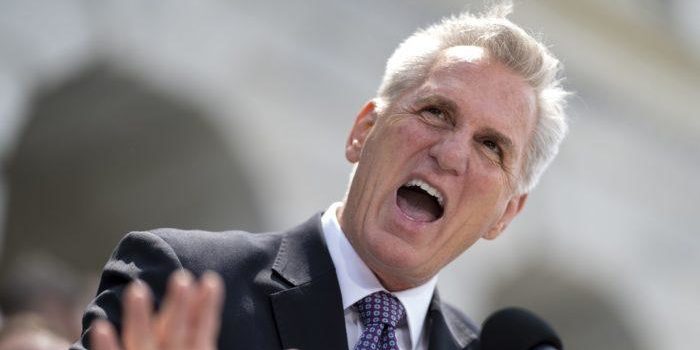(Headline USA) About 6 in 10 U.S. adults said they wanted any increase in the debt limit to be coupled with agreed-upon terms for reducing the federal budget deficit, according to a new poll.
While the conclusion supports the Republican position of demanding compromise over the Biden administration’s economic brinksmanship, few respondents said they had a solid understanding of the ongoing debt limit negotiations.
In fact, slightly more said they approved of Biden’s handling of the situation over that of congressional Republicans—underscoring either conservatives’ longstanding distrust of pollsters and hesitation to identify themselves, or the success of mainstream media in suppressing relevant details about the two sides and their positions in the negotiations.
At the same time, Americans were more likely to disapprove than approve of how President Joe Biden and congressional negotiators on both sides of the aisle were handling negotiations.
And two-thirds said they were highly concerned about the impact on the national economy if the U.S. debt limit is not increased and the government defaults on its loans.
The new poll from The Associated Press-NORC Center for Public Affairs Research showed 27% approve of Biden and 26% about congressional Democrats, while 22% approved of congressional Republicans. Close to half disapprove of each.
Sixty-six year-old Robert Hutchins said he somewhat approves of how House Speaker Kevin McCarthy and Republicans in Congress were handling negotiations.
“At least he’s trying to do something,” the Republican from Milton, Delaware, said of McCarthy’s leadership over his conference. “The Democrats want to spend more money and they don’t want any limit to it.”
Hutchins said he doesn’t have “any confidence whatsoever” in Biden and doesn’t believe in abolishing the debt ceiling, as it serves as a constant reminder of the nation’s debt load, which currently stands at $31.4 trillion.
Otherwise, “you just think you have an unlimited credit card and you can spend whatever you want,” he said.
Overall, about 2 in 10 U.S. adults said they were following negotiations over raising the debt limit extremely or very closely, and about 4 in 10 were following somewhat closely.
Similarly, about 2 in 10 said they understood the situation very well and about 4 in 10 said they understood it somewhat well.
Still, a clear majority—63%—said they think negotiations over the debt limit should be coupled with terms to reduce the budget deficit.
Nineteen percent said the debt limit should be raised without conditions, and 16% said it should not be raised at all.
Overall, 50% of respondents said it should be tied to terms about reducing the budget deficit.
Similar percentages of Republicans and Democrats said they were following and understood negotiations, and concern about the economy if the U.S. defaults was widely bipartisan. But about a third of Democrats said the national debt limit should be increased without conditions, while just 6% of Republicans said the same.
Twenty-three percent of Republicans but just 7% of Democrats say the national debt limit should not be increased under any circumstances.
House Republicans already passed a bill to address the crisis with appropriate cuts to the Biden regime’s unfettered spending—which not only has ushered in the perennial debt debate but also contributed vastly to inflation among everyday Americans. However, the legislation now remains stalled in the Democrat-led Senate.
Treasury Secretary Janet Yellen warned this week that a national default would destroy jobs and businesses, and leave millions of families who rely on federal government payments to “likely go unpaid,” including Social Security beneficiaries, veterans and military families.
An AP-NORC poll conducted earlier this year also showed little consensus on cuts that would make a dent in the deficit: While most Americans said the government spends too much overall, majorities favored increased spending on popular and expensive programs including Medicare and Social Security.
Neither of those is at risk in the GOP package, which largely targets Biden’s so-called Inflation Reduction Act and other recent pork-barrel spending sprees.
Aaron Loessberg–Zahl, a 33-year-old Democrat from San Jose, California, said the debt ceiling should be raised without conditions.
“Congress already controls the purse strings, they approve the annual budgets for our government,” Loessberg–Zahl said, “and I think that’s plenty of control over the spending.”
He called the debate over whether and how to raise the debt ceiling “not productive” and said he approved of the president’s handling of negotiations.
“My belief is that those people probably don’t understand the full ramifications of what would happen if the country were to default,” Loessberg–Zahl said,
The poll of 1,680 adults was conducted May 11-15 using a sample drawn from NORC’s probability-based AmeriSpeak Panel, which is designed to be representative of the U.S. population. The margin of sampling error for all respondents is plus or minus 3.4 percentage points.
Adapted from reporting by the Associated Press

